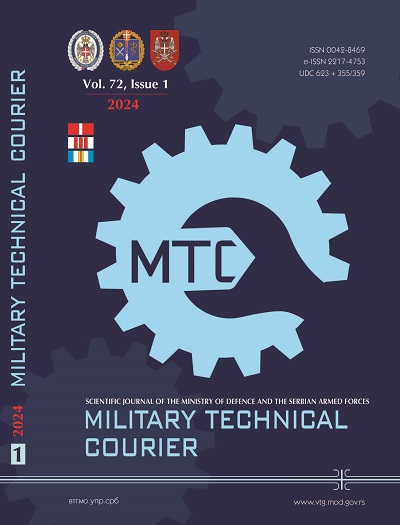Optimal adjusting of simulated annealing parameters
Abstract
Introduction/purpose: Simulated annealing is a powerful technique widely used in optimization problems. One critical aspect of using simulated annealing effectively is a proper and optimal adjustment of its parameters. This paper presents a novel approach to efficiently adjust the parameters of simulated annealing to enhance its performance and convergence speed.
Methods: Since the simulated algorithm is inspired by the cooling Metropolis process, the basic idea is to simulate and analyze this process using a mathematical model. The proposed work tends to properly imitate the Metropolis cooling process in the algorithmic field. By intelligently adjusting the temperature schedule, temperature reduction and cooling rate, the algorithm optimizes the balance between exploration and exploitation, leading to improved convergence and higher-quality solutions.
Results: To evaluate the effectiveness of this approach, it was applied first on a chosen sample function to be minimized, and then on some usual known optimization functions. The results demonstrate that our approach, called Optimal Adjusting of Simulated Annealing parameters (OASA), achieves superior performance compared to traditional static parameter settings and other existing approaches, showing how to well adjust the parameters of the simulated annealing algorithm to improve its efficiency in terms of solution quality and processing time.
Conclusion: Adjusting the algorithm parameters could have a significant contribution in the optimization field even for other metaheuristics.
References
Bertsimas, D. & Nohadani, O. 2010. Robust optimization with simulated annealing. Journal of Global Optimization, 48, pp.323-334. Available at: https://doi.org/10.1007/s10898-009-9496-x.
Bertsimas, D. & Tsitsiklis, J.N. 1993. Simulated Annealing. Statistical Science, 8(1), pp.10-15. Available at: https://doi.org/10.1214/ss/1177011077.
Benvenuto, N., Marchesi, M. & Uncini, A. 1992. Applications of simulated annealing for the design of special digital filters. IEEE Transactions on Signal Processing, 40(2), pp.323-332. Available at: https://doi.org/10.1109/78.124942.
Bierlaire, M. 2006. Introduction à l’optimisation différentiable. Lausanne, Switzerland: EPFL Press. ISBN: 978-2-88074-669-8.
Chen, T.-Y. & Su, J.-J. 2002. Efficiency improvement of simulated annealing in optimal structural designs. Advances in Engineering Software, 33(7-10), pp.675-680. Available at: https://doi.org/10.1016/S0965-9978(02)00058-3.
Frausto-Solis, J., Román, E.F., Romero, D., Soberon, X. & Liñán-García, E. 2007. Analytically Tuned Simulated Annealing Applied to the Protein Folding Problem. In: Shi, Y., van Albada, G.D., Dongarra, J. & Sloot, P.M.A. (Eds.) Computational Science – ICCS 2007, 7th International Conference, Beijing, China, May 27-30. Berlin, Heidelberg: Springer, vol 4488. Available at: https://doi.org/10.1007/978-3-540-72586-2_53.
Gao, Y., Wang, C. & Liu, C. 2016. An Archived Multi-Objective Simulated Annealing Algorithm for Vehicle Routing Problem with Time Window. International Journal of u- and e- Service, Science and Technology, 9(12) pp.187-198. Available at: https://doi.org/10.14257/ijunesst.2016.9.12.17.
Hu, Q. & Lim, A. 2014. An iterative three-component heuristic for the team orienteering problem with time windows. European Journal of Operational Research, 232(2), pp.276-286. Available at: https://doi.org/10.1016/j.ejor.2013.06.011.
Ingber, L. 1989. Very fast simulated re-annealing. Mathematical and Computer Modelling, 12(8), pp.967-973. Available at: https://doi.org/10.1016/0895-7177(89)90202-1.
Ingber, L. 2000. Adaptive Simulated Annealing (ASA): Lessons learned. arXiv:cs/0001018. Available at: https://doi.org/10.48550/arXiv.cs/0001018.
Jeong, S.-J., Kim, K.-S. & Lee, Y.-H. 2009. The efficient search method of simulated annealing using fuzzy logic controller. Expert Systems with Applications, 36(3), pp.7099-7103. Available at: https://doi.org/10.1016/j.eswa.2008.08.020.
Jones, A.E.W. & Forbes, G.W. 1995. An adaptive simulated annealing algorithm for global optimization over continuous variables. Journal of Global Optimization, 6, pp.1-37. Available at: https://doi.org/10.1007/BF01106604.
Kim, S.-S., Baek, J.-Y. & Kang, B.-S. 2017. Hybrid Simulated Annealing for Data Clustering. Journal of Korean Society of Industrial and Systems Engineering, 40(2), pp.92-98. Available at: https://doi.org/10.11627/jkise.2017.40.2.092.
Kirkpatrick, S., Gelatt, C.D. & Vecchi, M.P. 1983. Optimization by Simulated Annealing. Science, 220(4598), pp.671-680. Available at: https://doi.org/10.1126/science.220.4598.671.
Lin, S.-W. & Yu, V.-F. 2012. A simulated annealing heuristic for the team orienteering problem with time windows. European Journal of Operational Research, 217(1), pp.94-107. Available at: https://doi.org/10.1016/j.ejor.2011.08.024.
Najid, N.M., Dauzere-Peres, S. & Zaidat, A. 2017. A modified simulated annealing algorithm for solving flexible job shop scheduling problem. In: IEEE International Conference on Systems, Man and Cybernetics, Yasmine Hammamet, Tunisia, 5, October 6-9. Available at: https://doi.org/10.1109/ICSMC.2002.1176334.
Pan, X., Xue, L., Lu, Y. & Sun, N. 2019. Hybrid particle swarm optimization with simulated annealing. Multimedia Tools and Applications, 78, pp.29921-29936. Available at: https://doi.org/10.1007/s11042-018-6602-4.
Rajasekaran, S. 2000. On Simulated Annealing and Nested Annealing. Journal of Global Optimization, 16, pp.43-56. Available at: https://doi.org/10.1023/A:1008307523936.
Saruhan, H. 2014. Differential evolution and simulated annealing algorithms for mechanical systems design. Engineering Science and Technology, an International Journal, 17(3), pp.131-136. Available at: https://doi.org/10.1016/j.jestch.2014.04.006.
Zhang, R. 2013. A Simulated Annealing-Based Heuristic Algorithm for Job Shop Scheduling to Minimize Lateness. International Journal of Advanced Robotic Systems, 10(4), pp.1-9. Available at: https://doi.org/10.5772/55956.
Copyright (c) 2024 Allaoua Hemmak

This work is licensed under a Creative Commons Attribution 4.0 International License.
Proposed Creative Commons Copyright Notices
Proposed Policy for Military Technical Courier (Journals That Offer Open Access)
Authors who publish with this journal agree to the following terms:
Authors retain copyright and grant the journal right of first publication with the work simultaneously licensed under a Creative Commons Attribution License that allows others to share the work with an acknowledgement of the work's authorship and initial publication in this journal.
- Authors are able to enter into separate, additional contractual arrangements for the non-exclusive distribution of the journal's published version of the work (e.g., post it to an institutional repository or publish it in a book), with an acknowledgement of its initial publication in this journal.
- Authors are permitted and encouraged to post their work online (e.g., in institutional repositories or on their website) prior to and during the submission process, as it can lead to productive exchanges, as well as earlier and greater citation of published work (See The Effect of Open Access).

